The Intel Core i9-7980XE and Core i9-7960X CPU Review Part 1: Workstation
by Ian Cutress on September 25, 2017 3:01 AM ESTBenchmarking Performance: CPU Encoding Tests
One of the interesting elements on modern processors is encoding performance. This includes encryption/decryption, as well as video transcoding from one video format to another. In the encrypt/decrypt scenario, this remains pertinent to on-the-fly encryption of sensitive data - a process by which more modern devices are leaning to for software security. Video transcoding as a tool to adjust the quality, file size and resolution of a video file has boomed in recent years, such as providing the optimum video for devices before consumption, or for game streamers who are wanting to upload the output from their video camera in real-time. As we move into live 3D video, this task will only get more strenuous, and it turns out that the performance of certain algorithms is a function of the input/output of the content.
All of our benchmark results can also be found in our benchmark engine, Bench.
7-Zip 9.2: link
One of the freeware compression tools that offers good scaling performance between processors is 7-Zip. It runs under an open-source licence, is fast, and easy to use tool for power users. We run the benchmark mode via the command line for four loops and take the output score.
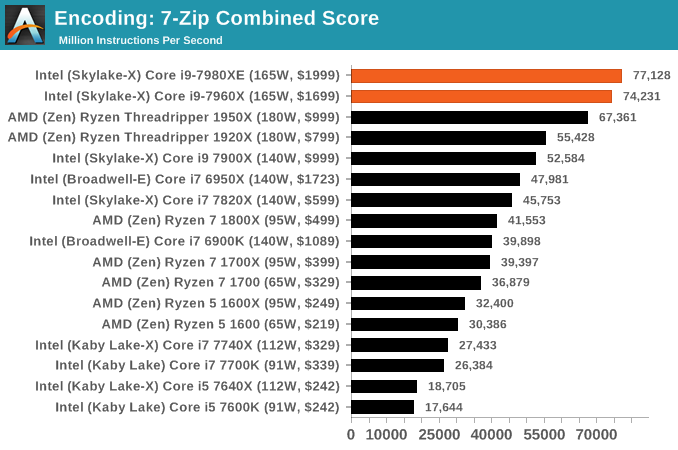
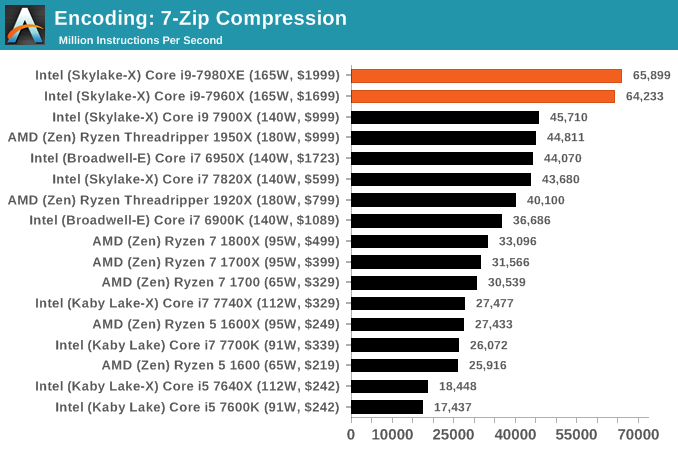
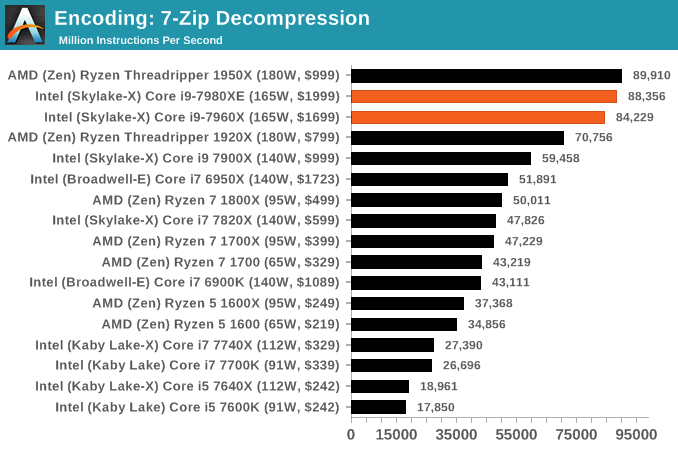
WinRAR 5.40: link
For the 2017 test suite, we move to the latest version of WinRAR in our compression test. WinRAR in some quarters is more user friendly that 7-Zip, hence its inclusion. Rather than use a benchmark mode as we did with 7-Zip, here we take a set of files representative of a generic stack (33 video files in 1.37 GB, 2834 smaller website files in 370 folders in 150 MB) of compressible and incompressible formats. The results shown are the time taken to encode the file. Due to DRAM caching, we run the test 10 times and take the average of the last five runs when the benchmark is in a steady state.
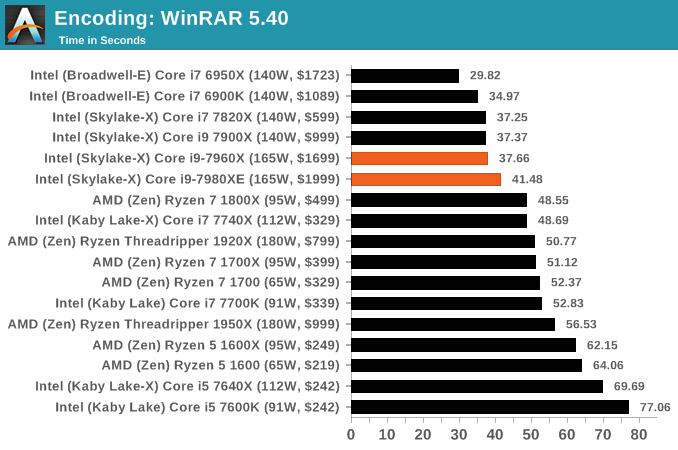
AES Encoding
Algorithms using AES coding have spread far and wide as a ubiquitous tool for encryption. Again, this is another CPU limited test, and modern CPUs have special AES pathways to accelerate their performance. We often see scaling in both frequency and cores with this benchmark. We use the latest version of TrueCrypt and run its benchmark mode over 1GB of in-DRAM data. Results shown are the GB/s average of encryption and decryption.
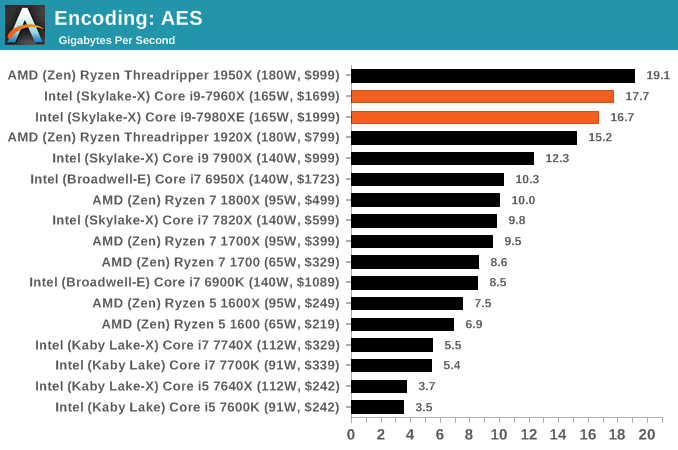
HandBrake v1.0.2 H264 and HEVC: link
As mentioned above, video transcoding (both encode and decode) is a hot topic in performance metrics as more and more content is being created. First consideration is the standard in which the video is encoded, which can be lossless or lossy, trade performance for file-size, trade quality for file-size, or all of the above can increase encoding rates to help accelerate decoding rates. Alongside Google's favorite codec, VP9, there are two others that are taking hold: H264, the older codec, is practically everywhere and is designed to be optimized for 1080p video, and HEVC (or H265) that is aimed to provide the same quality as H264 but at a lower file-size (or better quality for the same size). HEVC is important as 4K is streamed over the air, meaning less bits need to be transferred for the same quality content.
Handbrake is a favored tool for transcoding, and so our test regime takes care of three areas.
Low Quality/Resolution H264: Here we transcode a 640x266 H264 rip of a 2 hour film, and change the encoding from Main profile to High profile, using the very-fast preset.
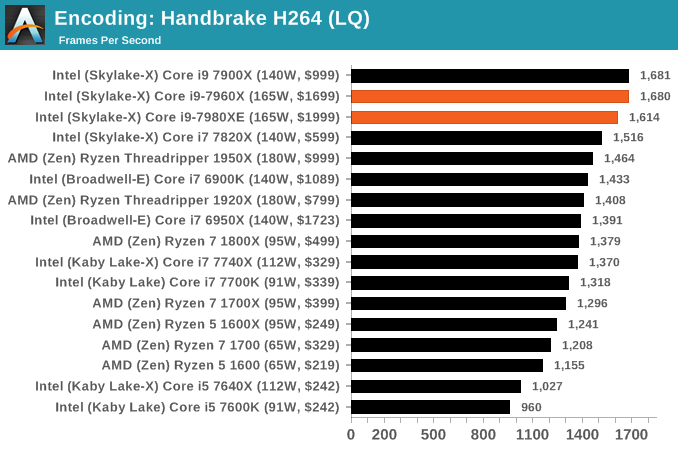
High Quality/Resolution H264: A similar test, but this time we take a ten-minute double 4K (3840x4320) file running at 60 Hz and transcode from Main to High, using the very-fast preset.
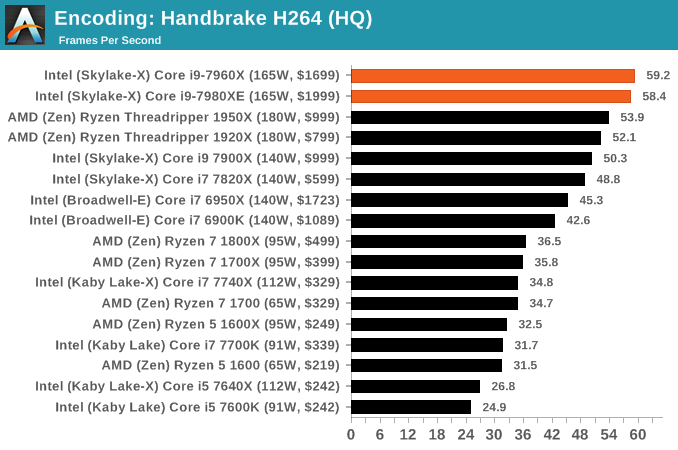
HEVC Test: Using the same video in HQ, we change the resolution and codec of the original video from 4K60 in H264 into 4K60 HEVC.
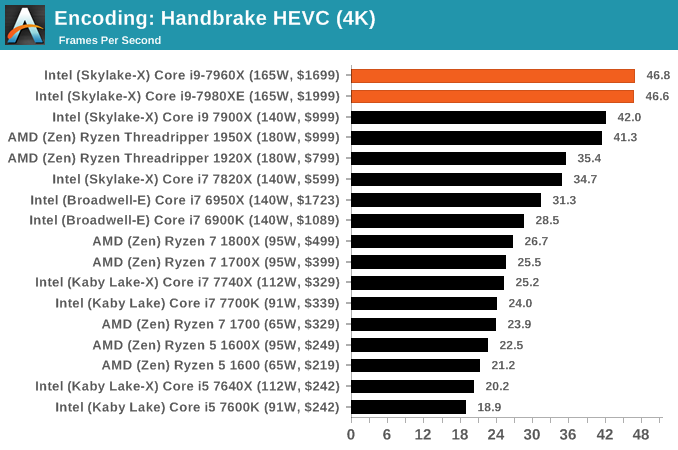










152 Comments
View All Comments
ddriver - Monday, September 25, 2017 - link
You are living in a world of mainstream TV functional BS.Quantum computing will never replace computers as we know and use them. QC is very good at a very few tasks, which classical computers are notoriously bad at. The same goes vice versa - QC suck for regular computing tasks.
Which is OK, because we already have enough single thread performance. And all the truly demanding tasks that require more performance due to their time staking nature scale very well, often perfectly, with the addition of cores, or even nodes in a cluster mode.
There might be some wiggle room in terms of process and material, but I am not overly optimistic seeing how we are already hitting the limits on silicon and there is no actual progress made on superior alternatives. Are they like gonna wait until they hit the wall to make something happen?
At any rate, in 30 years, we'd be far more concerned with surviving war, drought and starvation than with computing. A problem that "solves itself" ;)
SharpEars - Monday, September 25, 2017 - link
You are absolutely correct regarding quantum computing and it is photonic computing that we should be looking towards.Notmyusualid - Monday, September 25, 2017 - link
@ SharpEarsYes, as alluded to by IEEE. But I've not looked at it in a couple of years or so, and I think they were still struggling with an optical DRAM of sorts.
Gothmoth - Monday, September 25, 2017 - link
and what have they done for the past 6 years?i am glad that i get more cores instead of 5-10% performance per generation.
Krysto - Monday, September 25, 2017 - link
The would if they could. Improvements in IPC have been negligible since Ivy Bridge.kuruk - Monday, September 25, 2017 - link
Can you add Monero(Cryptonight) performance? Since Cryptonight requires at least 2MB of L3 cache per core for best performance, it would be nice to see how these compare to Threadripper.evilpaul666 - Monday, September 25, 2017 - link
I'd really like it if Enthusiast ECC RAM was a thing.I used to always run ECC on Athlons back in the Pentium III/4 days.Now with 32-128x more memory that's running 30x faster it doesn't seem like it would be a bad thing to have...
someonesomewherelse - Saturday, October 14, 2017 - link
It is. Buy AMD.IGTrading - Monday, September 25, 2017 - link
I think we're being to kind on Intel.Despite the article clearly mentioning it in a proper and professional way, the calm tone of the conclusion seem to legitimize and make it acceptable that Intel basically deceives its customers and ships a CPU that consumes almost 16% more power than its stated TDP.
THIS IS UNACCEPTABLE and UNPROFESSIONAL from Intel.
I'm not "shouting" this :) , but I'm trying to underline this fact by putting it in caps.
People could burn their systems if they design workstations and use cooling solutions for 165W TDP.
If AMD would have done anything remotely similar, we would have seen titles like "AMD's CPU can fry eggs / system killer / motherboard breaker" and so on ...
On the other hand, when Intel does this, it is silently, calmly and professionally deemed acceptable.
It is my view that such a thing is not acceptable and these products should be banned from the market UNTIL Intel corrects its documentation or the power consumption.
The i7960X fits perfectly in its TDP of 165W, how come i7980X is allowed to run wild and consume 16% more ?!
This is similar with the way people accepted every crapping design and driver fail from nVIDIA, even DEAD GPUs while complaining about AMD's "bad drivers" that never destroyed a video card like nVIDIA did. See link : https://www.youtube.com/watch?v=dE-YM_3YBm0
This is not cutting Intel "some slack" this is accepting shit, lies and mockery and paing 2000 USD for it.
For 2000$ I expect the CPU to run like a Bentley for life, not like modded Mustang which will blow up if you expect it to work as reliably as a stock model.
whatevs - Monday, September 25, 2017 - link
What a load of ignorance. Intel tdp is *average* power at *base* clocks, uses more power at all core turbo clocks here. Disable turbo if that's too much power for you.